PTF Impacts
Provost's Teaching Fellows have made lasting impacts in their departments, colleges and schools, all of the University of Texas, and even the broader scholarship of teaching and learning. Through both individual initiatives and university-wide programs, PTFs continue to serve as catalysts for positive change and further our campus culture of teaching and learning.
Displaying 1 - 25 of 28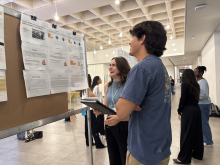
Applications of Data Science with City Datasets: Poster Session at UT Austin
On April 30, 2025, Guyot hosted a public poster session showcasing student projects focusing on datasets from the City of Austin Open Data Portal, held at the University of Texas at Austin. Projects ranged widely in focus, from environmental data to transportation and public safety, demonstrating the breadth of student inquiry and analysis.
City of Austin Data Meetup (online)
At the end of each semester, about 10 students volunteer to present their findings to the City of Austin employees during one of their regular data meetups.
Teaching Climate Change Canvas Module
A campus-wide faculty learning community constructed a canvas sandbox website where we could share materials related to climate change, with annotations, with the broader UT community. We collected our groups materials, and tried to organize them in a useful way. This includes lectures, activities, quizzes, projects, pre/post tests, etc. We organize both by learning objective, and by course. Our website is now live. A publication on pre/post survey results is being prepared.
Bringing Introductory Astronomy to a Broad Audience via Web-based Instruction
In 2024, I piloted a new web-based version of Astronomy 301 (Introductory to Astronomy), and taught it a second time in 2025. I attempted to include best practices for active learning, which was a challenge in this environment.
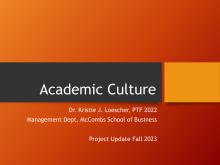
Teaching as Well Being (UT System)
3 different PTF projects presented:
Loescher project focuses on: Elevate excellence in the classroom through new strategies to understand, measure, and improve rigor in all courses
•each class is designed and delivered with the expectation of students learning at high levels •each student demonstrates learning at high levels
•each student is supported so they can learn at high levels
View the poster here
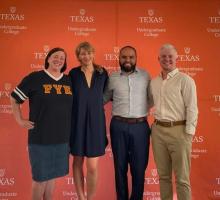
Be Well to Do Well (Signature Course Resource)
This video project was designed to be shown in all Signature Courses at UT. Together with a discussion prompt, the video aims to acquaint students with mental and physical health resources on campus, and to teach them strategies for success.
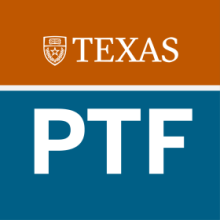
Teaching Tips 2023-2024
Each year, the PTF Chair-Elect has the opportunity to share recurring Teaching Tips with the all faculty at UT.
Open Data Day (Austin Public Library) and Statistics Seminar (Texas State University)
Two presentations about promoting the use of a local open data portal for data science projects.
The first presentation was made with the collaboration of a former student/current UGCA at an event organized by Open Austin, which addresses local social and civic challenges through creative uses of technology.
The second presentation was made at the weekly statistics seminar at Texas State University with mostly professors in attendance.

ClioVis: Visualizing Connections (Review, Journal of American History)
Dr. Jason Heppler of George Mason University reviewed ClioVis, the digital timeline visualization tool developed by Erika Bsumek, in the March 2024 issue of the Journal of American History. According to an excerpt from the review:
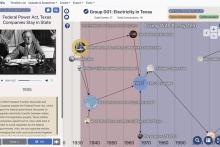
The Art of Mapping History (Life and Letters)
Life and Letters, the print and digital magazine of the UT College of Liberal Arts, featured ClioVis, the digital timeline visualization tool developed by Erika Bsumek's PTF initiative, in their November 2023 issue.

Teaching Tips 2022-2023
Each year, the PTF Chair-Elect has the opportunity to share recurring Teaching Tips with all faculty at UT. These messages cover a variety of topics, styles, and methodologies, from brief and practical classroom strategies to in-depth conversations with voices from across campus.
This year’s Teaching Tips were written by Chair-Elect Nina Telang, from the Chandra Department of Electrical and Computer Engineering.

Supplemental Instruction (SI) Program for Electrical and Computer Engineering
For her Provost's Teaching Fellows initiative, Nina Telang developed of a Supplemental Instruction (SI) program in a sophomore-level Electrical and Computer Engineering course, EE319K: Introduction to Embedded Systems.
Supplemental Instruction (SI) study sessions to help students succeed in introductory courses by employing a peer teaching model. SI Leaders – TAs or peers who have already successfully taken the course – plan and lead two identical, voluntary SI sessions each week, which students can join at any point in the semester.

The Evolution of Peer-Assisted Learning: From SI to PLUS (ASEE)
Former PTF chair Nina Telang co-presented this paper at the American Society of Engineering Education (ASEE) Annual Conference in August 2022.

Teaching Tips 2021-2022
Each year, the PTF Chair-Elect has the opportunity to share recurring Teaching Tips with all faculty at UT. These messages cover a variety of topics, styles, and methodologies, from brief and practical classroom strategies to in-depth conversations with voices from across campus.
This year’s Teaching Tips were written by Chair-Elect Jessica Toste, from the Department of Special Education.

Implementation of a new student initiative: Promoting Student Success and Well-Being (ASEE Gulf-Southwest)
Former PTF chair Nina Telang co-presented this paper at the American Society of Engineering Education (ASEE) Gulf-Southwest Annual Conference in March 2021. This paper shares a detailed look into the implementation of a new student initiative focused on promoting student success and well-being.
Read the complete paper <here,> or find the abstract below.

ClioVis: Kendra Scott WEL Female Founder Competition Semi-Finalist and Crowd Choice Winner
The Kendra Scott Women's Entrepreneurial Leadership Institute (KS WELI) held the inaugural Female Founder Pitch Competition in October 2021.
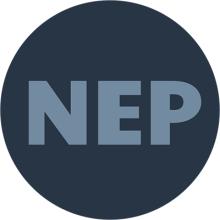
Interview with Dr Erika Bsumek, the creator of ClioVis (Not Even Past, UT Department of History)
In September 2020 History faculty Adam Clulow interviewed Erika Bsumek for Not Even Past, the digital magazine of the UT Department of History, to discuss the development, use, and impacts of ClioVis, the digital timeline visualization tool created as part of Bsumek's PTF Initiative. This article is part of a wider series that explored how teachers and students across the History department, the university and world more generally responded in new ways to the unprecedented classroom environment faced in a time of global pandemic.

Qualitative and Quantitative Impact of Metacognitive Interventions in Supplemental Instruction Sessions (ASEE)
Former PTF chair Nina Telang co-presented this paper at the American Society of Engineering Education (ASEE) Virtual Annual Conference in June 2020.
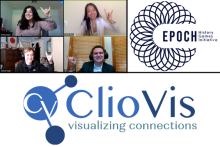
Digital Projects Enrich Undergraduate Research: ClioVis and Epoch (History Department News)
ClioVis, the digital timeline visualization tool created by Erika Bsumek as part of her PTF Initiative, was highlighted in UT Department of History News on May 25, 2020 by Dr. Megan Raby. The article explored the ways that ClioVis and Epoch, an initiative by History faculy Adam Clulow, are being used to create undergraduate research opportunities for UT liberal arts and history students.
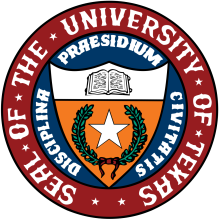
Critical Literacies Project: ClioVis (UT System P20 Projects)
The UT System works with internal and external partners to foster critical literacies in students across the P20 continuum. UT institutions work to cultivate these literacies in students across traditional and emerging academic disciplines, and through partnerships and programs in PK12 schools, communities, and business and industry across Texas.

Editor's Choice Award: ClioVis Description, Origin, and Uses (Digital Humanities Now)
"ClioVis: Description, Origin, and Uses," a September 2020 article from Not Even Past: the digital magazine of the UT Department of History, was awarded Editor's Choice by the online aggregate Digital Humanities Now.

Thinking Critically with ClioVis (Pedagogy Playground)
Dr. Lindsey Passenger Wieck, faculty at St. Mary's University in San Antonio, Texas, reviewed ClioVis for the pedagogy blog Pedagogy Playground: Innovative Teaching in Higher Education in February 2020. The review discusses her experiences with ClioVis during and after a workshop led by Bsumek, and goes on to highlight the features of the tool which she finds most compelling: interactivity, collaboration, ease of use, exportability, and applications outside of coursework.

Drivers Exercise
Before deciding what your career goals are, it’s critical to know what you value most in a job. What gets you out of bed to go to start the day, go to work, and/or live your life? This exercise will help you define and prioritize what drives you. We provide definitions of 8 common "drivers". Once you understand these drivers, you can take the exercise and go through a ranking process to determine which are most important to you (i.e. you’re less likely to compromise on these) and which are less important (i.e. you’re more willing to compromise on these).

Effectiveness of the Supplemental Instruction Program in First-Year Engineering Courses - A Longitudinal Report (ASEE)
Former PTF chair Nina Telang co-presented this paper at the American Society of Engineering Education (ASEE) Annual Conference in June 2019.

